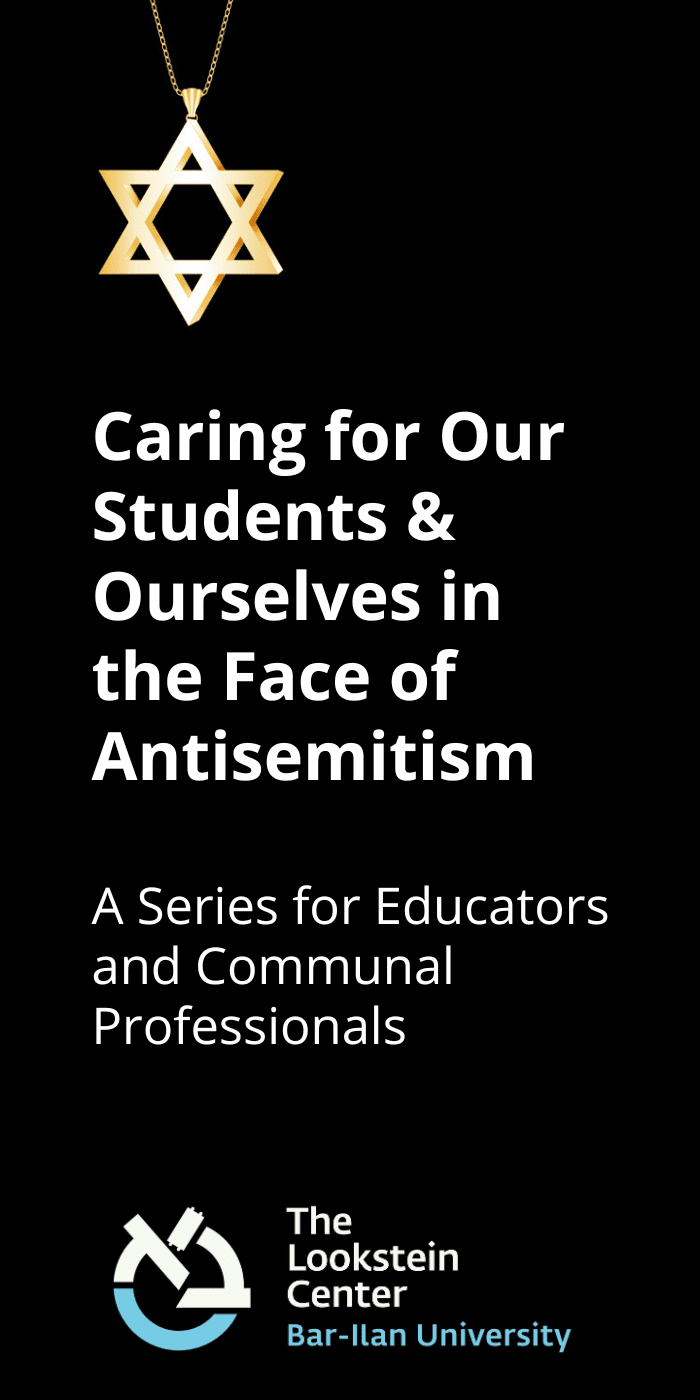Resurgence of Antisemitism
Many of us may still vividly remember the neo-Nazi march in Charlottesville, Virginia in 2017, the synagogue shooting in Pittsburgh, Pennsylvania in 2018, the stabbing in Monsey, New York in 2019, and the recent assaults on Jewish individuals during the Israeli-Arab conflict in May of this year. It seems that in the last few years racially, religiously, and politically based antisemitic attacks in the United States have increased and become more violent—recent statistics made available by the FBI show that antisemitism continues to be a serious issue. In fact, over 60 percent of all U.S. religious hate crimes in 2019 have targeted the Jewish community, despite making up only 2 percent of the U.S. population.
It may not come as a surprise that this trend is also present in educational settings such as college campuses and K-12 schools where antisemitic incidents, especially related to anti-Zionism, nearly doubled in recent years. College campuses have become more and more hostile to Jewish students, who report having been insulted, intimidated, and harassed simply for being Jewish. There have been even a few cases where a Jewish student decided to leave the college because of feeling physically and emotionally threatened.
Coping Skills
At a time where antisemitic incidents continue to rise, it is important that Jewish students are equipped with tools and resources that will allow them to navigate hostile college campuses. It is equally important that they have at their disposition coping skills to deal more effectively with discrimination and emotional distress. It is generally acknowledged that experiences with discrimination have an impact on an individual’s self-esteem and overall well-being. Educators and professional counselors can play an important role in supporting Jewish students. They are the first in line and are uniquely positioned to teach students coping skills, such as deep breathing, self-awareness skills, mindfulness, communication skills, and problem-solving skills. For example, educators may start by teaching self-awareness skills, engaging students in journaling activities where students reflect on their experiences with antisemitism and how these experiences have impacted them. As a next step, educators or counselors may introduce mindfulness and practice with students their ability to notice physical sensations or thoughts in the here and now without judgment, assisting them to notice how their physical sensations change when they are exposed to antisemitism. In addition, educators and professional counselors may be able to connect students who struggle with experiences of antisemitism with other students who struggle with similar issues to build a support system.
Jewish Identity
However, based on my doctoral research, there is another aspect that educators and professional counselors may want to consider when working with Jewish students, which is their identity and more specifically their Jewish identity. It is generally acknowledged that Jews are an ethno-religious group even though there is a tendency in the U.S. to erase the ethnic part of the Jewish identity and present it as a religious identity only. A great example here is the hate crimes statistics presented by the FBI, where hate crimes against Jews are recorded as religious hate crimes even in those incidents where the motivation for the hate crime may not have been of a religious nature (e.g., vandalizing buildings or cemeteries with swastikas or comments such as “Hitler was right”). In both of these examples, the nature of the hate crime is of a racial nature and not necessarily motivated by religious beliefs.
Importance of Jewish Ethnic and Religious Identity
Having a closer look at both aspects (ethnicity and religion) of Jewish identity is important because overall Jews living in the U.S. tend to identify as Jewish based on ethnicity and to a lesser extent on religion. A strong Jewish identity does not need to be based on religious practices. In fact, Simon N. Herman suggests in his 1989 book, Jewish Identity: A social psychological perspective, that Jewish identity is constructed on a continuum and that Jews can choose from a range of religious and/or cultural aspects to express their Jewish identity. At one side of the spectrum stands the assimilated Jew who has no relationships with other fellow Jews and does not observe any religious practices and on the other side stands the Orthodox Jew who is a Zionist.
The term ethnic identity is a construct and is not easily defined; it tends to be described as a chosen identity (consciously or unconsciously) and is often rooted in common history, traditions, language, behaviors, and values. Jewish identity is a multifaceted and unique identity as it may be experienced as a mix of ethnic components and religious aspects. Jewish ethnic identity can be based on national aspects, such as belonging to a people, cultural practices such as the consumption of specific foods, or language such as using Yiddish expressions. While religious observance such as religious practices (keeping kosher) and beliefs play a significant role in the development of a Jewish religious identity. Thus, Jewish identity is an ethno-religious identity, an identity where ethnic identity and religious identity are intertwined. Whether an individual’s Jewish identity is a resource or an exacerbating factor in stressful situations depends on the strengths of an individual’s Jewish ethnic and religious identity, as their strengths tend to impact how encounters with antisemitism are experienced and processed. Experiences with antisemitism can be detrimental and have a negative impact on an individual’s mental health and overall well-being and can increase symptoms of depression.
In my research, I found that both a strong ethnic identity and a strong religious identity play a crucial part in how often someone faces antisemitism and how stressful the encounter is for the individual. Jews with a strong ethnic identity reported overall having been exposed to antisemitism more often during their life compared to Jews with weaker ethnic identity. In addition, Jews with a strong ethnic identity also perceived the antisemitic incident as more stressful than Jews with a weaker ethnic identity. In contrast, Orthodox Jews who tend to report a stronger religious identity reported lower levels of stress when exposed to antisemitism compared to individuals with a weaker religious identity. The differences in halachic observance and the strengths of religious beliefs may be an explanation why Orthodox Jews reported lower levels of stress when exposed to antisemitism. It is possible that the lower stress levels may be due to better religious coping skills. For instance, discrimination may be experienced as a trial by Orthodox Jews and therefore may be a stimulus for spiritual growth. Difficulties may be viewed as an opportunity to overcome obstacles and remain unwavering in the face of adversity. In addition, Orthodox Jews, in general, tend to live in tight knit communities and interact primarily with individuals within their community when they need support. However, more research will be necessary to get a better understanding of this phenomenon.
Implications
Based on my findings, educators and professional counselors need to be aware that the Jewish identity is an ethno-religious identity that is composed of two distinct yet intertwined aspects which are religion and ethnicity. Professionals working with Jewish students may want to reflect on their assumptions about what it means to be a Jew and to what extent they believe that a Jewish identity must be based on religious beliefs and practices. This is crucial as the findings of my research indicate that Jews with a strong ethnic identity report experiences with antisemitism more often than individuals with a weaker ethnic identity. In addition, educators may want to assist their Jewish students in exploring their assumptions about what it means to be a Jew and how they express their identity. Exploring the student’s level of ethnic and religious identity will help educators to identify those students that may be at a greater risk to develop mental health issues. Educators may also want to discuss with students the many different forms of antisemitism as it can be based on religious and ethnic bias as well as anti-Israel attitudes. Educators and professional counselors can play an important role in addressing antisemitism and advocating for their Jewish students. Additionally, educators can support their students by teaching how to identify antisemitism, how to address it, and how to advocate for themselves.

Michaela Ambrosius is a multilingual licensed professional counselor in private practice in Montclair, NJ, and in New York, NY. Dr. Ambrosius received her Ph.D. in counselor education from Montclair State University where she teaches as an adjunct. She specializes in trauma-focused therapy and has a special interest in addressing antisemitism.
Reach 10,000 Jewish educational professionals. Advertise in the upcoming issue of Jewish Educational Leadership.





